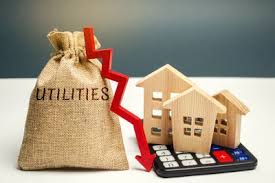Many households prioritize cutting down on utility bills. With simple and effective strategies, you can significantly reduce your monthly expenses while maintaining comfort and convenience. Here are some practical tips to help you save money on your utility bills.
Optimize Heating and Cooling
Adjust Your Thermostat
- Programmable Thermostat: Install a programmable or smart thermostat that automatically adjusts the temperature based on your schedule. Lower the temperature in winter and raise it in summer when you’re not home to save energy.
- Seasonal Settings: In winter, keep the thermostat at around 68°F (20°C) when you’re home and lower when you’re asleep or away. Set it to 78°F (25°C) in summer and higher when you’re not home.
Regular Maintenance
- HVAC System: Schedule annual maintenance for your heating and cooling systems to ensure they run efficiently. Replace filters regularly to improve airflow and efficiency.
- Seal Leaks: Check for drafts around windows and doors and seal them with weatherstripping or caulk to prevent heat loss in winter and heat gain in summer.
Use Energy-Efficient Appliances
Upgrade Appliances
- Energy-Efficient Models: Consider replacing old appliances with energy-efficient ones. Look for the ENERGY STAR label, which indicates superior energy efficiency.
- Proper Usage: Use appliances wisely by running dishwashers and washing machines with full loads and using energy-saving settings when available.
Efficient Lighting
- LED Bulbs: Replace incandescent bulbs with LED bulbs, which use up to 75% less energy and last much longer.
- Turn Off Lights: Make it a habit to turn off lights when leaving a room and utilize natural light during the day whenever possible.
Water Conservation
Fix Leaks
- Repair Drips: A dripping faucet can waste significant water over time. Fix any leaks promptly to avoid unnecessary water usage.
- Low-Flow Fixtures: Install low-flow showerheads and faucets to reduce water consumption without sacrificing performance.
Efficient Water Heating
- Lower Temperature: Set your water heater to 120°F (49°C) to save energy and reduce the risk of scalding.
- Insulate Water Heater: Insulate your water heater and pipes to minimize heat loss and reduce the energy needed to keep water hot.
Monitor and Manage Usage
Track Consumption
- Utility Monitoring Tools: Use tools and apps provided by your utility company to monitor your usage and identify areas where you can cut back.
- Regular Audits: Conduct regular home energy audits to spot inefficiencies and opportunities for savings.
Behavioural Changes
- Unplug Devices: Many electronics consume power even when turned off. Unplug chargers, televisions, and other devices when not in use, or use power strips to disconnect multiple devices at once easily.
- Smart Power Strips: Invest in smart power strips that automatically cut off power to devices in standby mode.
Optimize Utility Plans
Compare Rates
- Shop Around: Look for the best rates and plans for your utility services. For instance, exploring green mountain rates can help you find a more cost-effective and environmentally friendly electricity plan.
- Bundled Services: Some providers offer discounts if you bundle multiple services like electricity, gas, and internet.
Renewable Energy Options
- Solar Panels: If feasible, consider installing solar panels to generate your own electricity and reduce reliance on the grid.
- Green Energy Plans: Choose plans that include renewable energy sources. These plans can sometimes be more cost-effective and environmentally friendly.
Efficient Use of Appliances
Laundry Practices
- Cold Water Wash: Wash clothes in cold water to save on the energy needed to heat the water.
- Line Drying: Whenever possible, dry clothes on a clothesline or drying rack instead of a dryer.
Smart Cooking
- Efficient Cooking Methods: To save energy, use a microwave, toaster oven, or slow cooker instead of a conventional oven.
- Cover Pots: When boiling water or cooking on the stove, cover pots and pans to reduce cooking time and energy usage.
Conclusion
Slashing your utility bills doesn’t require drastic changes. By making a few simple adjustments, using energy-efficient appliances, and being mindful of your energy and water usage, you can significantly reduce your expenses. Implementing these strategies will not only save you money but also contribute to a more sustainable and environmentally friendly home.

